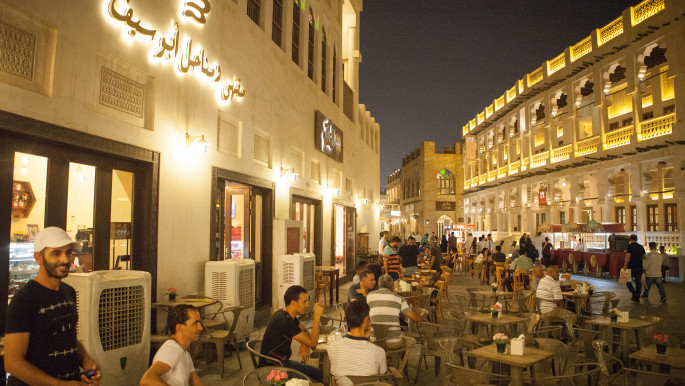'Your friendly neighbourhood Qatari': YouTuber hopes to break Gulf stereotypes and foster cross-culture interactions
"Nobody knew what the truth is!" the energetic Qatari entrepreneur told The New Arab whilst reminiscing an assertion he once heard from an expatriate: in Qatar, an unwanted prolonged eye-to-eye contact with a woman can send one to jail.
"That's absurd! Staring is probably weird and mean, but not illegal. We had to produce a video to explain it," he said.
In August 2015, Al Haroon stepped in and launch QTips, a series of informative videos available on YouTube and Facebook to provide a broad audience with accurate and trustworthy cultural tips about the emirate’s lifestyle.
The first video, Right is Right, explains why in Qatar it is polite to let the person on your right-hand side go in first.
Another episode informs how to behave politely when turning down a cup of Arabian coffee. "People can now hear the truth directly from a Qatari," Al Haroon comments enthusiastically.
 |
People can now hear the truth directly from a Qatari |
 |
Building bridges
Yet, stereotypes live on and Ali A. Hadi Alshawi, Associate Professor in Sociology at Qatar University, recalls that mainstream Western outlets often associate the region with "wealthy people, deserts and camels".
QTips’ videographer Timothy Jason Carr claims American TV contents to be "skewed" whenever reporting on Gulf countries and Hamad Al Amari, a Qatari standup comedian who co-hosts QTips, was "afraid of Arabs" while growing up in the US.
 |
|
| Al Haroon records an episode of cultural education YouTube programme QTips [Sebastian Castelier] |
In this environment, the video show stands as a powerful tool to deconstruct stereotypes and raise cultural awareness about the subtleties of Gulf societies.
Indeed, although certain cultural traits feature by the show are specific to Qatar, others are alike elsewhere in the Gulf.
Al Haroon believes it "busts a lot of myths" by highlighting "similarities beyond differences", "we open the door for intelligent, informative and inquisitive conversations," adds Al Amari.
Five years on, the programme totalises million of views as its audience includes tourists, Qatar residents, nationals, future expatriates and even newcomer embassy-staffs who watch to enhance their cultural skills.
Al Amari recalls a Serbian man who decided to come to Qatar after he watched the programme. "Did I ever think a Serbian would watch QTips? Hell no!"
While the show is occasionally reproached of avoiding key sensitive topics, such as recurrent criticisms on labour workers issues, Al Haroon argues that QTips is not government-funded and follows one solo purpose: to share pieces of cultural knowledge with a global audience.
World Cup and diasporas
In 2022, Qatar will host the FIFA World Cup and this set of 180 videos is expected to come in handy to international visitors who are largely unfamiliar with the culture.
By watching QTips prior to their arrival, they can get a better grasp of it. For Alshawi, the tournament is "an opportunity for Qatar to showcase its cultures but also to change the global attitude and perception towards the Middle East," adding that Qataris-fans interactions will surely happen.
 |
|
| In they alleys of Souq Waqif, Doha's best-known open-air marketplace, Qatari nationals, foreign residents and tourists cross each other’s paths [Sebastian Castelier] |
While a lack of personal connexions between Qataris and foreigners is a source of disappointment for many expatriates, Al Haroon argues that "numbers play against it" as foreigners in Qatar exceeds by far the indigenous population.
Regarding the language barrier, he added that "not every Qatari speaks English, but not enough people effort to learn Arabic."
Alshawi indicates that hang out spots are also not necessarily the same since social habits can be different too.
"Sometimes we just don't have the opportunity to mix," Alshawi concluded.
"We cannot act as diasporas do not exist," said Al Amari, referring to a multitude of communities stationed in the country and which account for 88 percent of the total population.
He laughs and said that even teas served in Qatar are not local but an Indian flavoured beverage brought in by the diaspora. "We’ve to give credit where it is due," he said.
Since June 2019, QTips has been releasing episodes of a series on diasporas in Qatar in a bid to open dialogue and deepen mutual understanding between the different communities based in the emirate.
A first video on the Filipino diaspora has been watched over 37,000 times.
For Hamad Al Amari, those community-centred videos could even be personified. "Let's have a Bangladeshi guy to talk about his community," he said, mirroring QTips' decision in 2017 to welcome aboard Aisha Al-Zaimi to host episodes on female-oriented cultural elements.
Looking for it, Al Haroon, alias "Mr. Q your friendly neighbourhood Qatari," ends a shooting on the Bangladesh community in Qatar.
He expresses a wish to be seen as one of the faces of Qatar to foster genuine cross-culture interactions. "I hope that I represent my country well."
Sebastian Castelier is a journalist reporting on Gulf societies and Asia-Gulf migrations. Follow him on Twitter: @SCastelier





 Follow the Middle East's top stories in English at The New Arab on Google News
Follow the Middle East's top stories in English at The New Arab on Google News


